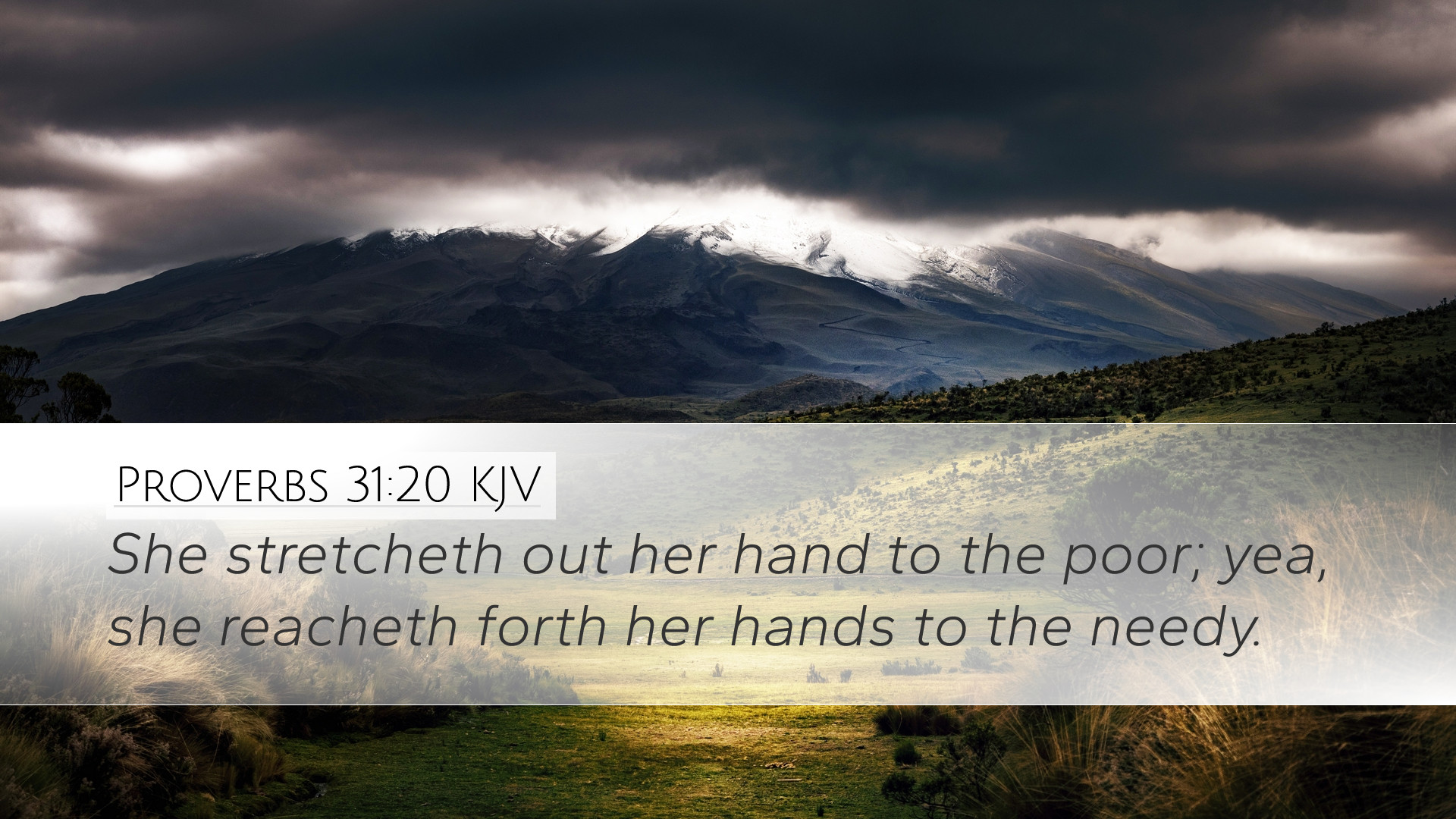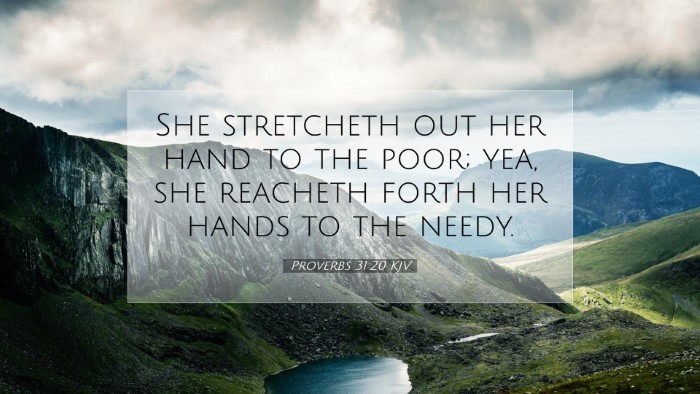Commentary on Proverbs 31:20
Verse: "She opens her hand to the poor and reaches out her hands to the needy." (Proverbs 31:20, ESV)
Introduction
This verse is part of a larger passage in Proverbs 31 that extols the virtues of the ideal woman, often referred to as the Proverbs 31 Woman. In this particular verse, we see a significant characteristic of her character: generosity. This commentary will explore the implications of this generosity, its roots in biblical teaching, and its application in the lives of pastors, students, theologians, and Bible scholars.
Exegesis and Theological Insights
1. The Nature of Generosity
In this verse, the act of opening her hand to the poor signifies a heart inclined toward benevolence and compassion. Matthew Henry notes that her generosity is not merely an act of giving but an expression of her character. She is characterized by an active engagement in the well-being of those in need. Such an act requires more than mere resources; it requires a readiness of heart and willingness to serve.
2. Wisdom in Action
Albert Barnes points out that the woman's actions are a reflection of the wisdom and understanding that guide her life. The wisdom depicted in Proverbs is practical and transformative, influencing the way one interacts with others. To open one’s hands to the poor is not just a good deed; it is rooted in a deeper understanding of one's obligation to serve God through serving humanity.
3. The Reach of Compassion
Adam Clarke emphasizes the breadth of the outreach depicted in this verse. The phrase “reaches out her hands” suggests an active, intentional effort to assist those in distress. This emphasizes the woman's proactive nature; she does not wait for the needy to come to her but seeks them out. In the context of pastoral ministry, it is crucial for leaders to embody such compassion, leading congregations that actively engage with their communities’ needs.
Practical Applications
1. Pastoral Responsibilities
For pastors, the principle illustrated in Proverbs 31:20 serves as a call to ministry that extends beyond the pulpit. It invites leaders to consider how they can collectively equip their congregations to meet needs, fostering a culture of generosity that is outward-focused. Pastoral leadership is not only about preaching but also about mobilizing members to serve those who are vulnerable within the community.
2. The Role of the Church
The church is called to be the hands and feet of Jesus, reaching out to those who are disadvantaged. This verse encourages congregations to develop outreach programs that reflect their commitment to social justice and mercy. The church's vitality can be measured not only by spiritual growth but also by its capacity to make tangible differences in the lives of the poor and needy. Generosity is an essential hallmark of a Christ-centered community.
3. Academic Engagement
For students and scholars of theology, Proverbs 31:20 invites deep reflection on the implications of faith in action. It challenges them to examine their understanding of charity, the nature of service, and how these themes are interwoven throughout Scripture. There is an opportunity here to research historical and contemporary responses to poverty and to contribute to scholarship that advocates for systemic change in line with biblical teachings on justice and mercy.
Spiritual Reflections
1. Generosity as a Spiritual Discipline
This verse encourages individuals to view generosity not merely as a duty but as a disciplined practice that aligns the heart with the heart of God. Engaging in acts of kindness and social justice can deepen one's spiritual life, creating opportunities for discipleship and growth in grace. It is in giving that believers often experience true joy and fulfillment, reflecting the character of Christ.
2. The Essence of Faith Manifested
Moreover, the verse serves as a reminder that faith must manifest itself through tangible actions. A faith that does not exhibit itself in works of charity and compassion can be seen as incomplete (James 2:26). Thus, this passage calls believers to reflect on their own lives—are we truly opening our hands to those in need? Are our hearts moved by the plight of the poor?
Conclusion
Proverbs 31:20 provides profound insights into the nature of generosity as a Christian virtue. The woman described in this verse exemplifies a heart devoted to the service of others, a principle that resonates deeply within the Christian tradition. By nurturing a spirit of generosity, individuals and the church as a whole can live out their calling to reflect God's love and mercy in a world that is often marked by need.
In practical terms, whether as pastors, students, or theologians, there is an opportunity to continue exploring how this wisdom from Proverbs can influence actions and policies that affect the poor and needy. As we reflect on this passage, let us strive to embody the qualities of the Proverbs 31 Woman in our thoughts, actions, and ministries.


